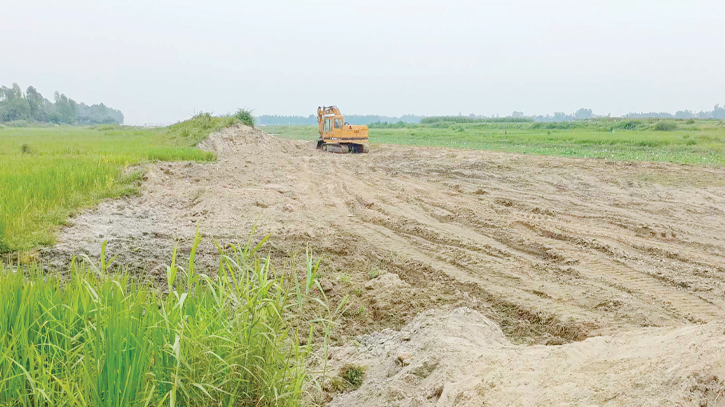
Soil-cutting activities are running rampant at the bank of Kakan River by local influencers utilizing excavators and tractors. This photo was taken recently. Photo: Messenger
Illegal cutting and selling of soil from the Kakan riverbank in Raipura, Narsingdi, is causing significant concern as it disrupts river ecology and contributes to untimely river erosion.
Local influencers are engaging in these illegal activities, utilizing excavators and tractors for the operations. This rampant exploitation of the riverbed not only poses a threat to the environment but also jeopardizes crop production on the adjacent lands.
Recently, on a Tuesday afternoon, Raipura Upazila Assistant Commissioner (Land) Md. Shafiqul Islam, accompanied by law enforcement officers, visited the site and issued orders to halt the illegal soil cutting activities. Upon inspection of Kandapara village, excavators were found abandoned, and mounds of soil were piled up, indicative of ongoing illegal operations. However, work halts during the day due to fear of reprisal from locals and the administration. When questioned, villagers hesitated to speak out against the influential individuals involved in the illicit soil trade, fearing repercussions.
Reports suggest that two years prior, the canal of the Kakon river, traversing Srinagar union and municipal areas of the upazila, was re-excavated, leaving piles of soil on the adjacent croplands. Recently, accusations have surfaced against a local influencer for cutting and selling soil from the Chakra Canal's bank with the help of accomplices. This relentless soil excavation poses a direct threat to crop yields in the surrounding areas.
Anonymous sources allege that a local syndicate has been operating round the clock, utilizing numerous tractors to extract soil from the canal banks and selling it elsewhere. Despite being aware of these activities, the administration's inaction has allowed the exploitation to continue unabated. The influential status of the perpetrators seems to shield them from any consequences, perpetuating the illegal soil trade.
Assistant Commissioner Md. Shafiqul Islam emphasized the need to remove obstacles, such as excavators, to curb illegal land cutting during his recent visit to the site. Dr. Badiul Alam of Narsingdi reiterated that the unauthorized sale of excavated soil cannot be tolerated, instructing local authorities to take swift action against those involved.
Rivers serve as vital components of both terrestrial and aquatic ecosystems. However, they face immense pressure from various natural and anthropogenic activities, including indiscriminate extraction of construction-grade sand and stones. Illegal mining operations, often orchestrated by sand mafias, further exacerbate these issues, leading to degradation of riparian zones and loss of biodiversity.
The environmental ramifications of indiscriminate riverbed mining are significant, affecting the health and functioning of rivers. Unscientific extraction practices contribute to erosion, habitat destruction, and disruption of natural processes. This review underscores the urgent need to address the adverse effects of riverbed mining on the broader ecosystem.
In conclusion, the illegal cutting and selling of soil from riverbeds pose multifaceted threats to both the environment and local communities. Urgent intervention is required to enforce existing regulations, hold perpetrators accountable, and mitigate the adverse impacts on river ecosystems.
Messenger/Faria








